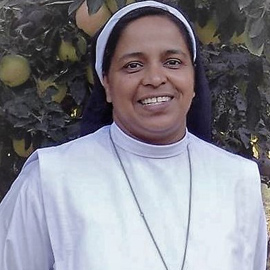Christians after Kashmir ruling: 'Now to promote development for all'
Sr. Maria Suzette, of the Apostolic Carmelite congregation who has lived in the disputed Muslim-majority region for 16 years, recounts her experience to AsiaNews. Yesterday, a constitutional panel issued a verdict that the revocation of Kashmir's autonomy in 2019 was a legitimate act by the Narendra Modi-led government.
Srinagar (AsiaNews) - "If on the one hand I accept the Supreme Court's verdict on Kashmir, on the other I hope that the young people who live in the region are educated to become good citizens and that ordinary people can live in peace."
These are the words of Sr. Maria Suzette, of the Congregation of the Apostolic Carmel, after yesterday a constitutional panel made up of five judges ruled that the Indian government acted legally in 2019 when it revoked the autonomy of Jammu and Kashmir, guaranteed by Article 370 of the Constitution.
The bench, headed by Justice D.Y. Chandrachud, ruled that Article 370 was a temporary provision "necessary due to war conditions in the State" and was not intended to develop "internal sovereignty", the ruling said. The special status was to be considered “a characteristic of asymmetric federalism, not of sovereignty,” the court specified.
However, in its verdict, the Supreme Court did not rule on the validity of what is called the Jammu and Kashmir Reorganization Act, the 2019 law that provides for Jammu and Kashmir to join the Indian Union as two Separate states. However, he ordered that local elections be called by September 2024.
The historical region of Kashmir has been disputed since the second half of the 1940s between India and Pakistan, who manage different parts of it (China also controls a very small section). The part administered by India is home to 12 million people, 70% of whom are Islamic, making the territory the only one with a Muslim majority in the entire country.
In 1949 the United Nations had asked Pakistan, which wanted to annex the territory, to withdraw its troops, and India to organize a referendum so that Kashmiri citizens could freely decide whether to join New Delhi or Islamabad.
Neither of the two eventualities ever came to fruition: over time, instead, groups of Islamist rebels arose who attacked the Indian army and today, with around 130 thousand Indian soldiers, Kashmir is the most militarized territory in the world. In 2019, the government led by Prime Minister Narendra Modi dismantled the local Parliament after imposing a communications blackout, arresting hundreds of activists and confining several former local heads of government to their homes, effectively annexing the region.
Sr. Maria Suzette has experienced all these events firsthand, having worked in Jammu and Kashmir for 16 years: "As an educator I have witnessed the lack of facilities to hone both the physical and mental skills of young people."
The nun of Apostolic Carmel was vice-principal of Burn Hall School in Srinagar, an institution under the administration of the diocese of Jammu and Kashmir. “We are confident that this Supreme Court verdict will bring development and progress to all, especially the weak, poor and vulnerable of the society.”
When asked by AsiaNews about her experience as vice principal, Sister Suzette said: "The children of Kashmir are brilliant, but the uncertainties linked to the territory disturb the rhythm of their lives. During my time at Burn Hall School we did our best to keep students connected to school life through various activities.”
Furthermore, the nun continued, emphasis was placed on the teaching of the Kashmiri language: "I have often insisted and ordered teachers to ensure that students learn Kashmiri, as must be done for indigenous cultures and languages. A person without knowledge of her language or culture is a human being without a proper pedestal."
Today, Sister Suzette works as the principal at the Apostolic Carmel and Junior College, Bandra, Mumbai. “In Kashmir, parents were cooperative. We educators did our best to guide children to formulate their own vision.”
Regarding the sentence, Msgr. Ivan Pereira, bishop of Jammu-Srinagar, told AsiaNews that whatever the Supreme Court says "is welcomed". “Any decision taken in the broader interest of peace in Jammu and Kashmir should be welcomed by all,” commented Sydney Rath, a Catholic from Kashmir.
12/02/2016 15:14







.png)










